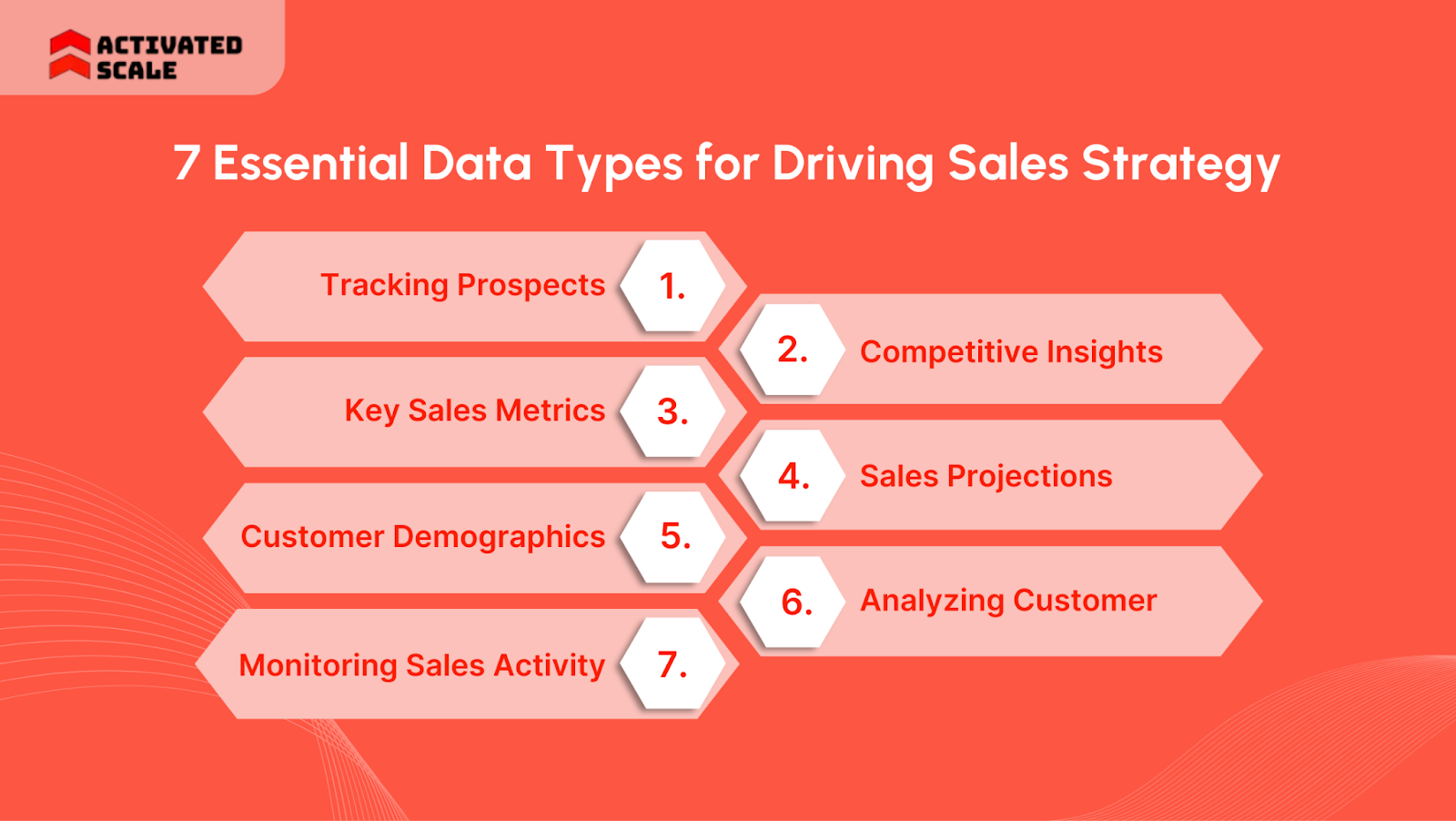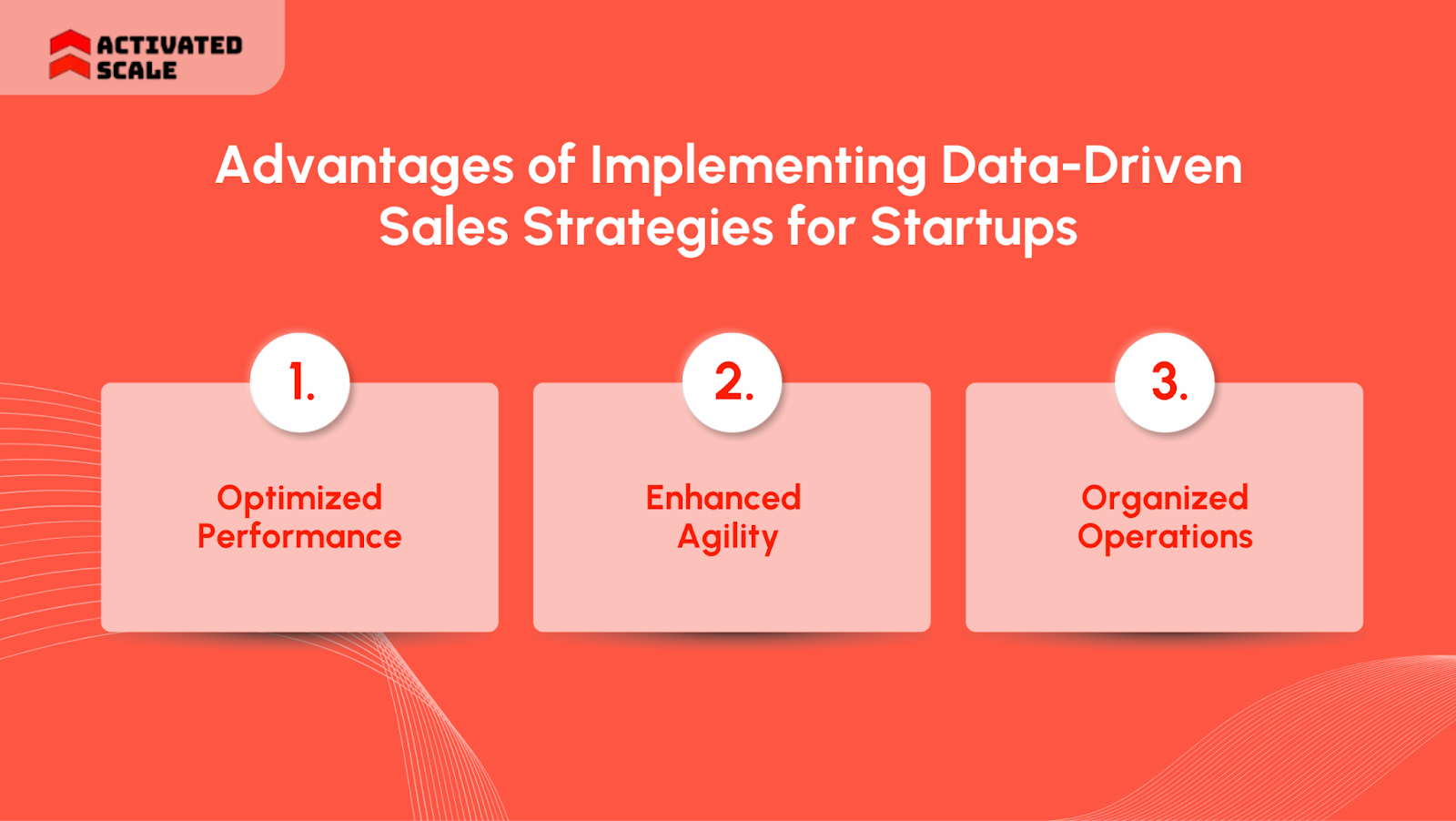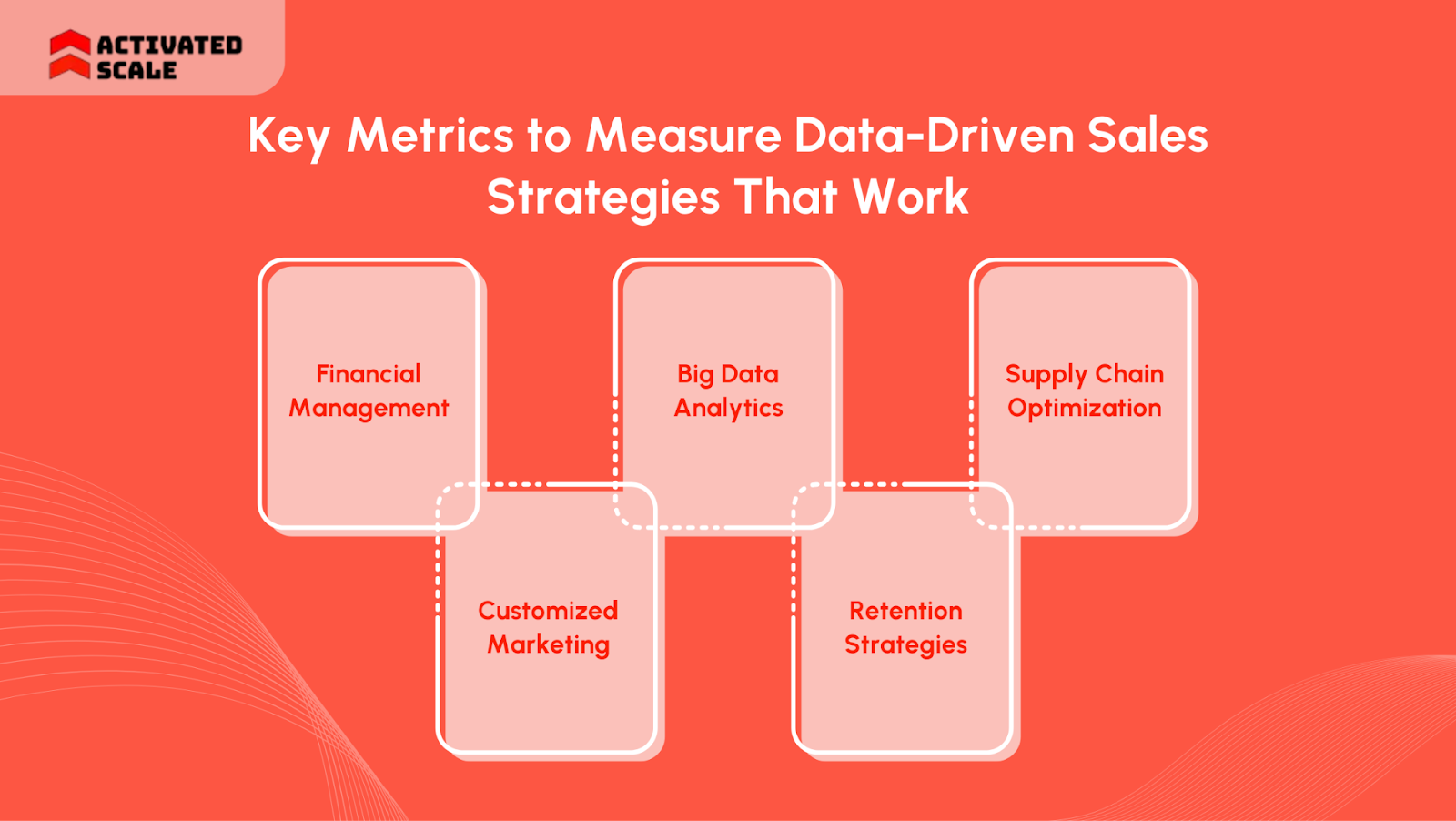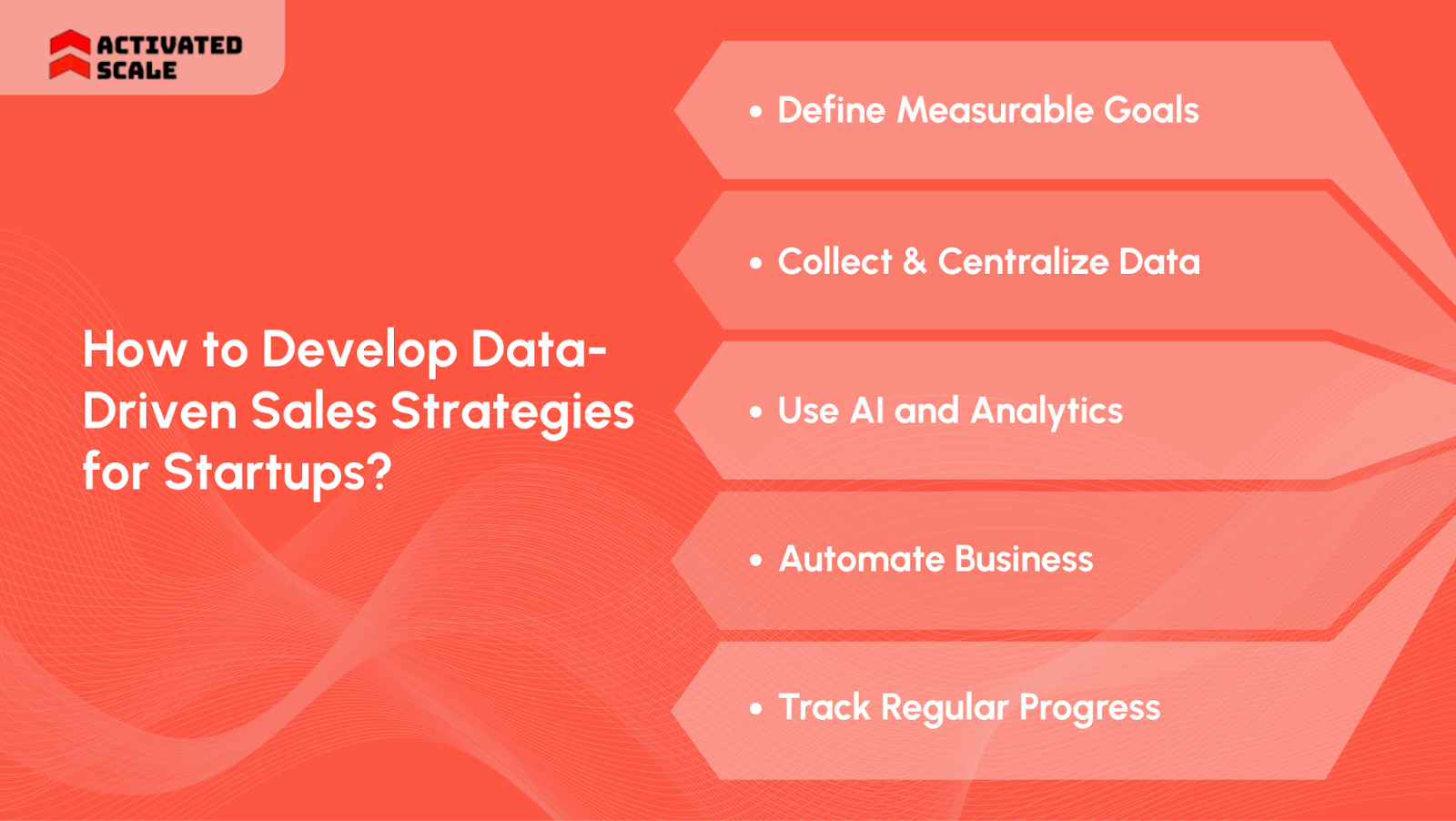Startups are racing against time and competitors, but many are still making sales decisions based on guesswork. What are they missing? The benefits of data-driven sales strategies for startups.
Without the right data, your sales team could be wasting valuable time, money, and resources. In fact, research shows that if businesses use data-driven approaches, they see a 63% increase in productivity.
We understand the challenges you face, such as unpredictable markets due to a lack of powerful strategies. So, in this blog, we’ll understand how data-backed strategies can sharpen decision-making and improve your go-to-market process.
In this way, you don’t need to rely on intuition alone, which is holding your startup back.
Quick Glance
- Data-driven sales strategies provide clarity, increasing the probability of success.
- Implementing a data-driven approach allows for better resource allocation, ensuring time and budget are spent on what truly matters.
- Predictive analytics help sales teams understand future trends, allowing for lead prioritization.
- Monitoring and optimizing performance with key metrics keeps your sales strategies agile.
- Tools like CRM systems and AI-powered analytics organize data collection and process automation.
Defining Data-Driven Sales Strategies: What You Need to Know
A data-driven sales strategy for startups is a method where your decisions are based on actionable insights derived from real-time data.
Your sales team can make smarter choices about where to invest time and resources by using data analytics.
The role of advanced analytics in data-driven sales, like big data and Artificial Intelligence (AI), cannot be overstated. These tools help identify patterns and predict trends that were previously out of reach.
Without these insights, startups risk relying on assumptions that could slow down progress. The various data points are the building blocks of a strategy that can propel your startup forward.
Each type offers unique insights that can accelerate growth. Let’s take a closer look at these crucial data types and how they directly impact your sales efforts.
Read Also: Best Sources for Sales Intelligence Data: An In-Depth Guide
7 Essential Data Types for Driving Sales Strategy

Are you missing critical data that could take your sales to the next level? Many startups overlook the most powerful insights right in front of them. Understanding these seven essential data types will enhance every aspect of your sales cycle.
Here’s how tracking the right metrics can fuel your startup’s growth:
1. Tracking Prospects
Every touchpoint matters, from emails and calls to website visits. Gathering data on these interactions allows your sales team to gauge buyer interest.
The result? Higher conversion rates and more personalized outreach.
2. Competitive Insights and Market Analysis
Knowing your competitors is crucial. You can position your offerings more effectively by analyzing their products, pricing, and market share.
Data helps identify competitive gaps and refine differentiation strategies to capture market share.
3. Key Sales Metrics and Performance Indicators
Metrics like conversion rates, win rates, and sales velocity provide a clear view of how your sales efforts are performing. These numbers reveal areas where improvements are needed, allowing you to fine-tune strategies.
4. Sales Projections and Predictive Analytics
Sales projections let you predict future trends based on historical data. Predictive analytics also helps you identify which leads are most likely to provide higher returns.
5. Customer Demographics and Preferences
Understanding your customers’ needs is crucial. Data gathered from surveys, Customer Relationship Management (CRM) systems, and social media interactions gives valuable insights into customer preferences.
Armed with this information, your sales and marketing teams can customize strategies to meet those exact needs.
6. Analyzing Customer Lifetime Value and Retention
Customer retention is a key to long-term growth. Post-sale data shows renewal rates and can reveal upselling opportunities. Focusing on customer lifetime value helps you build deeper relationships.
7. Monitoring Sales Activity and Rep Productivity
Measuring the activities of your sales team, such as calls, emails, and meetings, helps you identify high-performing behaviors.
When you know which actions drive results, you can replicate them across your team for consistent performance.
With Activated Scale’s Contract-to-Hire Sales Recruiting service, you can hire vetted sales professionals on a trial basis. Their expertise enables your startup to drive sales to new heights.
But how do these insights convert into actual business growth? The answer lies in the advantages of implementing a data-driven approach. Keep reading to discover the benefits you can’t afford to miss.
Advantages of Implementing Data-Driven Sales Strategies for Startups

What could you achieve if every sales decision were backed by reliable data? You’d see faster growth and smarter investments. Here’s how embracing data can convert your sales efforts:
- Optimized Performance: Data-driven decisions lead to measurable business improvements. You'll pinpoint areas that need attention and adjust accordingly.
- Enhanced Agility: Data lets you respond swiftly to market shifts and customer behavior, ensuring your sales strategy stays ahead of the curve.
- Organized Operations: Automating tasks and using AI-based tools enhances efficiency, allowing your sales team to focus on high-value activities. This is why 71% of organizations have implemented AI in their business operations.
You’ve seen how data can significantly enhance your sales strategy, but the next step is putting that data into action. The true power of a data-driven sales strategy for startups comes from the strategies that use the right metrics.
Also Read: Best B2B Lead Generation Databases for 2024
Key Metrics to Measure Data-Driven Sales Strategies That Work

Curious about how top startups use data to drive their growth? It’s about turning those numbers (data) into actionable strategies. From refining products to improving customer retention, these key metrics in different categories are your roadmap to success:
1. Data-Driven Financial Management
Financial management gives you a clear picture of your company’s financial health. Financial dashboards and automated systems help track expenses and optimize resource allocation.
Key Metrics:
- Cash Flow: Monitors the flow of cash in and out of the business to help prevent liquidity problems.
- Revenue Growth Rate: Tracks how quickly your business is growing in terms of revenue.
- Cost of Goods Sold (COGS): Tracks the direct expenses involved in producing the goods or services sold by your business.
- Return on Investment (ROI): Evaluates the profitability of investments and the effectiveness of capital utilization.
- Customer Acquisition Cost (CAC): Calculates the cost of acquiring a new customer, helping you assess the efficiency of marketing efforts.
Tools and Technology
Tools like QuickBooks for accounting and Adaptive Insights for forecasting provide an integrated view of your financial status. With real-time insights, your startup can make more informed decisions about investments and resource allocation.
2. Big Data Analytics
The real power of big data for product development lies in real-time customer feedback. Companies like Amazon use big data to understand customer preferences and create better products.
- Customer Feedback Frequency: Measures how often customers provide feedback, helping to identify areas of improvement.
- Usage Patterns: Tracks how customers use your product, revealing which features are most valuable.
- Feature Request Trends: Highlights which features customers are asking for the most.
- Product Satisfaction Scores: Gauge how satisfied users are with your product.
- Retention Rate of New Features: Measures how well new features are adopted and retained by customers.
Tools and Technology
To measure these metrics, you require tools like Customer Feedback Platforms (e.g., Qualtrics) and Product Analytics Software (e.g., Amplitude). These tools track user behavior and gather feedback, providing valuable insights for your product team.
3. For Supply Chain Optimization
Supply chain optimization can make or break a startup, especially when resources are limited. Using analytics to track supply chain performance ensures faster decision-making and more efficient operations.
Key Metrics:
- Inventory Turnover Rates: Measures how often inventory is sold and replaced over a period. High turnover indicates good inventory management.
- Delivery Times: Tracks how quickly products are delivered to customers, which impacts customer satisfaction.
- Supplier Lead Time: Measures the time between placing an order and receiving goods from suppliers.
- Stockouts and Overstock: Monitors situations where products are either understocked or overstocked, leading to lost sales or excessive inventory costs.
- Demand Forecasting Accuracy: Measures the precision of predicted demand, helping to adjust stock levels.
Tools and Technology
Tools like ShipBob (for order fulfillment) and Llamasoft (for supply chain analytics) help visualize these metrics to make better decisions.
4. Customized Marketing
Customized marketing is a necessity. Data lets you customize campaigns to specific customer preferences, making your outreach more effective.
Key Metrics:
- Customer Demographics: Tracks age, location, interests, etc., helping you tailor marketing messages for each segment.
- Purchase History: Reveals past buying behavior, allowing you to target relevant products.
- Browsing Behavior: Shows what customers are searching for or looking at on your website.
- Click-through Rates (CTR): Measures how often recipients click on links within emails, ads, or content.
- Conversion Rates: Tracks how many users take a desired action, like making a purchase or signing up.
Tools and Technology
Platforms like Dynamic Yield and Optimizely help personalize web content. Additionally, Google Analytics can track customer behavior for more effective targeting.
5. For Retention Strategies
Understanding why customers leave and preventing it should be a priority. Diagnostic analysis and tracking engagement metrics can identify at-risk customers before they leave.
Key Metrics:
- Churn Rate: Tracks the proportion of customers who discontinue their relationship with your business over a specific timeframe. A lower churn rate signifies stronger customer retention.
- Customer Lifetime Value (CLV): Measures the overall worth a customer contributes over the course of their relationship with your brand.
- Net Promoter Score (NPS): Assesses customer satisfaction and loyalty by determining how likely customers are to recommend your business to others.
- Customer Satisfaction Scores: Tracks customer sentiment and satisfaction with your product or service.
- Engagement Frequency: Measures how often customers interact with your product, service, or marketing content.
Tools and Technology
Tools like HubSpot and Gainsight help predict churn, allowing sales teams to engage proactively. These keep your retention rates high and your customers satisfied.
If you're ready to get the full potential of a data-driven sales strategy for startups, we, at Activated Scale, can help. With Fractional Sales Leadership, hire experienced VPs of Sales who specialize in integrating data-driven strategy into your sales process.
Now, you know the power of data-driven sales strategies. But how do you make them work for your startup? It all starts with implementing the right processes.
How to Develop Data-Driven Sales Strategies for Startups?

In startups, launching a sales campaign where every move is backed by real insights is not easy. However, with our guide, you can expect your desired result.
Unlike other online suggestions, this section will provide your team with actionable insights. In fact, they will have a strong understanding of strategies that need tweaking, all before the quarter ends.
So, if you’re ready to get similar results. Here’s how you can develop sales strategies:
Step 1: Define Measurable Goals
Start by setting clear, quantifiable sales goals. These include increasing revenue, boosting conversion rates, or expanding market share.
The right goals will guide what data you need to focus on, from lead generation to sales cycle length.
Step 2: Collect and Centralize Data
Next, bring all your data into one central hub. With integrated data systems, centralizing your information allows you to track and analyze performance from a single view.
Tools like Salesforce help integrate customer interactions, sales data, and feedback. This makes it easier for your team to act on the right information at the right time.
If you’re still building the foundation, Activated Scale’s Fractional Selling service can help you hire account executives. They can craft a data-centric roadmap that aligns with your unique goals.
Step 3: Use AI and Analytics for Actionable Insights
Use predictive analytics to project trends, sales opportunities, and customer behavior patterns. AI tools can help you understand how to prioritize efforts.
Start using tools like Clari or Gong, and your sales team can base decisions on real-time data. It can significantly increase the chance of closing deals.
Step 4: Automate Business and Sales Processes
Automation is key to scaling your data-driven strategy efficiently. Automate routine tasks like lead scoring and customer segmentation with tools like Drift or Marketo.
This ensures your team spends more time on high-impact activities.
Step 5: Track Regular Progress
Finally, monitor your progress by reviewing key performance indicators (KPIs) regularly. Use real-time dashboard reports to identify trends and areas for improvement.
This will allow you to evaluate your strategy continuously, ensuring your sales processes stay sharp.
Remember that your startup's growth is just one insightful decision away from becoming more predictable. Let’s make it happen together.
Also Read: Elevate Sales Team Performance with Strategic One-on-Ones
Final Thoughts
Wrapping up your journey brings the ability to use real-time insights, which can organize your operations. However, the truth is, implementing these strategies requires more than just knowledge. It takes the right tools, the right team, and the right plan.
That’s where Activated Scale comes in. With our services, you can bring in experienced sales leaders who are experts at building data-driven sales strategies. The best part is that they are the right talents for startups from the ground up.
Book a call with Activated Scale today, so our customized solutions can help your startup scale more efficiently.
FAQs
1. What makes a data-driven sales strategy so important for startups?
A data-driven sales strategy helps startups make informed decisions, prioritize high-potential leads, and optimize resource allocation. It helps predict future sales trends, ensuring smarter growth.
2. How can I start using data for sales at my startup?
Begin by setting clear sales goals, collecting relevant data through CRM systems, and using analytics tools to gain actionable insights. Don’t forget to focus on key metrics like churn rate, browsing behavior, etc.
3. Which tools can help automate my startup’s sales processes?
Tools like HubSpot for CRM, Drift for automated lead scoring, and Marketo for personalized email outreach. These tools can organize sales efforts.
4. How do I track the success of my data-driven sales strategy?
Regularly monitor KPIs like conversion rates, customer retention, and sales velocity. Use dashboards and reports to assess progress and adjust your strategy based on real-time data.
The Ultimate Guide to Hiring a Salesperson!
Get the step-by-step guide to hiring, onboarding, and ensuring success!
_edi.png)




